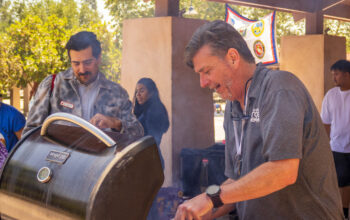The stars have been used to navigate and tell stories historically, but these days, when living in the city, they can go completely unnoticed.
The Physical Science Department is hosting a telescope night on Monday, Nov. 27, from sunset to 10:30 p.m. in the veranda outside the Planetarium in the Center for Sciences building.
Telescope Night is a free event and open to the public. Guests will observe a range of objects in the sky through motorized telescopes with built-in GPS systems.
Dale Fields, Physics and Planetary Sciences Department chair, is organizing Telescope Night along with a few astronomy student tutors. Fields said guests will have a view of the moon, a few galaxies, several planets and glass clouds that light up as new stars are born within them.
Fields said the motorized telescopes allow guests to name the planet they want to look at, and then it points right to it for viewers to enjoy.
“You are not just seeing some fantasy drawn up on a laptop. You are seeing that the moon has some geography to it, that it’s got mountains and deep holes and valleys opened up with different kinds of terrain in different places. That thing makes it real,” Fields said.
Astronomy tutor Joshua Becker is helping set up and align all the telescopes. He said it is important to have good weather conditions to see the moon and other deep sky objects clearly.
“The stars of the show will be the moon in its waxing gibbous phase, the andromeda galaxy, the orion nebula and much more,” Becker said.
Becker said anyone should attend these events to experience and view the universe from a different perspective.
“It’s not often we can actually connect with our place in the cosmos, especially living in the city. You look up at night and you’re lucky to see just a few stars, and you forget that there’s an entire living universe out there,” Becker said.
Marielle Stober, an astronomy tutor, has been participating in Telescope Nights for a few years and said everyone in the department wants to spread interest about the subject.
“There’s such a lack of enthusiasm when it comes to physical sciences because they are hard, so everyone is intimidated by it,” Stober said. “We want students to take astronomy classes because they want to, not because they have to.”
Stober said people can see galaxies and the birth and evolution of a star or planet by looking through a telescope.
Aside from the sights through the telescope, Stober knows what else people will see Monday.
“A bunch of the tutors just nerding out. You’ll know that person is a tutor if they are freaking out and geeking out over what they are seeing,” said Stober.




